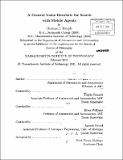| dc.contributor.advisor | Brian Williams and Anouck Girard. | en_US |
| dc.contributor.author | Temple, Thomas J. (Thomas John) | en_US |
| dc.contributor.other | Massachusetts Institute of Technology. Dept. of Aeronautics and Astronautics. | en_US |
| dc.date.accessioned | 2011-11-18T20:56:12Z | |
| dc.date.available | 2011-11-18T20:56:12Z | |
| dc.date.copyright | 2011 | en_US |
| dc.date.issued | 2011 | en_US |
| dc.identifier.uri | http://hdl.handle.net/1721.1/67175 | |
| dc.description | Thesis (Ph. D.)--Massachusetts Institute of Technology, Dept. of Aeronautics and Astronautics, 2011. | en_US |
| dc.description | Cataloged from PDF version of thesis. | en_US |
| dc.description | Includes bibliographical references (p. 181-187) and index. | en_US |
| dc.description.abstract | This dissertation considers a suite of search problems in which agents are trying to find goals in minimum expected time. Unlike search in data structures in which time is measured by a number operations, search in metric spaces measures time by units of distance and has received much less attention. In particular, search strategies that attempt to minimize expected search time are only available for a handful of relatively simple cases. Nonetheless many relevant search problems take place in metric spaces. This dissertation includes several concrete examples from navigation and surveillance that would have previously only been approachable by much more ad hoc methods. We visit these examples along the way to establishing relevance to a much larger set of problems. We present a policy that is an extension of Whittle's index heuristic and is applicable under the following assumptions. * The location of goals are independent random variables. " The agents and goals are in a length space, i.e., a metric space with continuous paths. * The agents move along continuous paths with bounded speed. " The agents' sensing is noiseless. We demonstrate the performance of our policy by applying it to a diverse set of problems for which solutions are available in the literature. We treat each of the following problems as a special case of a more general search problem: " search in one-dimensional spaces such as the Line Search Problem (LSP) and Cow Path Problem (CPP), " search in two-dimensional spaces such as the Lost in a Forest Problem (LFP) and problems of coverage, " problems in networks such as the Graph Search Problem (GSP) and Minimum Latency Tour Problem (MLTP), and " dynamic problems such as the Persistent Patrol Problem (PPP) and Dynamic Traveling Repairperson Problem (DTRP). On each of these we find that our policy performs comparably to, and occasionally better than, the accepted solutions developed specifically for these problems. As a result, we believe that this dissertation contributes a significant inroad into a large space of search problems that meets our assumptions, but that remains unaddressed. | en_US |
| dc.description.statementofresponsibility | by Thomas. J. Temple. | en_US |
| dc.format.extent | 192 p. | en_US |
| dc.language.iso | eng | en_US |
| dc.publisher | Massachusetts Institute of Technology | en_US |
| dc.rights | M.I.T. theses are protected by
copyright. They may be viewed from this source for any purpose, but
reproduction or distribution in any format is prohibited without written
permission. See provided URL for inquiries about permission. | en_US |
| dc.rights.uri | http://dspace.mit.edu/handle/1721.1/7582 | en_US |
| dc.subject | Aeronautics and Astronautics. | en_US |
| dc.title | A general index heuristic for search with mobile agents | en_US |
| dc.type | Thesis | en_US |
| dc.description.degree | Ph.D. | en_US |
| dc.contributor.department | Massachusetts Institute of Technology. Department of Aeronautics and Astronautics | |
| dc.identifier.oclc | 758487124 | en_US |
